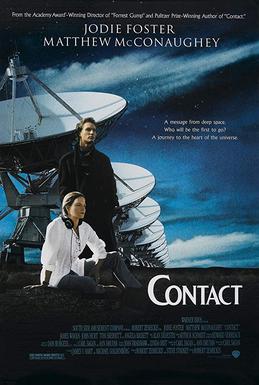Theological Notebook: The Movie "Contact" and the Myth of a Conflict Between Science and Religion
Here's a question: Why? In fact, that's my favourite question! But it's not too clear by itself, so let me give a little background so you can understand my specific use of the question.

( Read more... )

( Read more... )
Yes, and I sympathize with some of your later frustrations: the "worst of the worst" litany of being kicked out of Sunday School for "asking questions," or the utterly awful "can't understand God's will" response to her father's death. These are awful responses from within Christian perspective, much less from without. As a Christian I don't hold to the biblical literalism behind her childish Genesis reading, even though many American Christians do, and I see no problem with either the biological and cosmological idea of evolution, nor the idea that the first 11 chapters of Genesis contain literature of very mythological style. I still think myth has truth to teach, and it is the mythological truth of Genesis ch. 1 that the creation - the material world - is good which will eventually give rise to what we call "modern science" in the West, and not from any other advanced human culture. Also, I would minimize the sense of the priest's statement: I don't think the theological pictures this assumes - that God actively wills all events - makes a lick of sense. It succeeds in making a monster of God, though, but it fails to acknowledge both the freedom of human will, and the freedom endowed by the Creator into the creation itself: that "randomness" we speak of in science.
I think Palmer's point was more that he couldn't in good conscience send someone to represent humanity who didn't "disagree" with 95% of the planet by not believing in God or such, but who actively thought that that 95% was delusional, stupid, lying to themselves, naive, etc. It's the bigotry which he objects to, of the reductionistic Richard Dawkins sort, and I thought that was a stronger point, which could have been made stronger in the film, yes, but would have been helped had "Religion" been allowed to show its rationality, evidences, arguments, etc. The truly funny thing about this "science vs. religion" dichotomy, which is turned into a "reason vs. faith/non-reason" dichotomy, is the strong defense of Reason Christianity is holding to in the face of philosophy today. Whether in John Paul II's Faith and Reason or in Benedict XVI's Regensburg Address, Christianity is lining itself up as the primary defender of Reason, which I think will lead to a natural alliance with the physical sciences once the scientists get the propaganda out of their heads and learn a thing or three about what Christianity is really about.
Yes, she comes down to "faith" in the end regarding her own experience, although I thought this was a bit of a weak way out of the "science/religion" debate: once the Evil Government Conspiracy falls apart and anyone else starts using the machine, the house-of-cards conspiracy falls with it. That was a weaker piece of writing/logic. But the recognition that even regarding "scientific" things, there's a huge space for human experience and testimony there, well, that's a little more an enduring point.
So you were what? 16 what you wrote this revue? Nicely done!
Reply
Oh, goodness, no! I'm in my 30's, LOL. I'll have something more intelligent to say once I process all of this. Thanks for reading & commenting!
Reply
I guess I took the date in your username as a birthdate, which I think is the more common tendency.....
Reply
Reply
Leave a comment